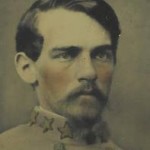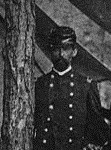0
Opting Out at Appomattox
April 9, 1865 marked the end of the Army of Northern Virginia. Union infantry had joined General Phil Sheridan’s cavalry at Lee’s front in time to thwart General John B. Gordon’s early-morning attempt to open a Confederate corridor to Lynchburg. It was news Robert E. Lee had hoped not to hear but for which he was prepared.
During the previous two days a series of messages on the subject of surrender had passed between Ulysses Grant and Lee. This morning’s situation compelled Lee to request a meeting with Grant. As Lee waited for a reply at his headquarters, he was joined by one of his staff officers, Lt. Colonel Walter Taylor. Under Lee’s orders, the twenty-six-year-old had spent the night placing the Confederate army’s dwindling but still lengthy train of supply wagons in secure locations.
Taylor advised Lee the slow-moving trains must be abandoned if the fleeing army were to be saved. Lee acknowledged the rationale of his young aide’s insight before revealing he had already decided upon surrender. Taylor acquiesced to the logic of his commander’s decision, but his disappointment was palpable.
Grant had been on the move toward the front during the night and could not easily be found. Only his acceptance of Lee’s proposal could end the fighting, but news of the imminent surrender spread through both armies, and a kind of informal truce developed, causing confusion among officers at the Federal front.
While Lee waited for word from Grant, one of Gordon’s staff officers escorted General James W. Forsyth of Sheridan’s staff into Lee’s camp. Forsyth explained General Sheridan was uncertain whether he could honor the informal truce without authorization from Grant or General George Meade. Uncertain of Grant’s whereabouts, Sheridan asked that Forsyth be taken through the Confederate lines to Meade. (Union forces formed a wide arc around the Army of Northern Virginia; the most direct route to Meade’s headquarters lay through rebel lines.) Eager to avoid additional bloodshed, Lee assigned Taylor to escort Forsyth to the Union lines and back.
Taylor completed his task and rejoined Lee, whom he found sitting under an apple tree west of his headquarters. A Union officer under a flag of truce was soon escorted to Lee. He was Colonel Orville Babcock of Grant’s staff, and he carried Grant’s response. It said the general was pushing his way to the front and asked that Lee arrange a location for the surrender.
Appomattox Court House, a small village about a mile west of Lee’s apple tree, was the logical location. Lee asked two of his staff, Colonel Charles Marshall and Taylor, to ride there with him. Although Taylor had been at Lee’s side through every major battle of the Army of Northern Virginia, he begged off, citing weariness from his back-to-back rides through the lines as the reason.
The basis of Taylor’s refusal was, however, emotional rather than physical. Years later, in his book Four Years with General Lee, he described the incident as follows:
I shrank from this interview, and while I could not then, and cannot now, justify my conduct, I availed myself of the excuse of having taken the two rides through the extent of our lines and to those of the enemy. . . and did not accompany my chief in this trying ordeal.
Empathetic and compassionate, Lee excused his young aide from the “trying ordeal.” Thus, only Colonel Marshall accompanied Lee and Babcock into Appomattox Court House where Marshall arranged for Wilmer McLean’s front parlor to be the place where the Army of Northern Virginia would be written out of existence.
About half an hour later, around 1 o’clock, Grant reached the village, entered the McLean house, and invited several other officers inside to observe the surrender. Among them were two of his staff, Colonel Theodore S. Bowers and Colonel Horace Porter.
Porter’s 1897 book, Campaigning with Grant, contains a detailed eyewitness account of the surrender. In it he describes the conversation between the generals, Grant’s writing out — in pencil — his terms of surrender, and Lee’s review of them. He records Lee’s concern that the terms did not permit his soldiers to retain their horses. Grant, who had been unaware that even privates in the Confederate armies owned their mounts, declined to rewrite the terms but assured Lee he would instruct Union officers handling the Confederate paroles ” to let all the men who claim to own a horse or mule take the animals home with them to work their little farms.”
An appreciative Lee then agreed to the written terms, and Grant handed his penciled draft to Theodore Bowers whom he “directed . . . to make a copy in ink.” Colonel Bowers, a former newspaper editor from Illinois, had been Grant’s private secretary since the early days of the war and had prepared the final copies of hundreds of documents at the general’s behest. On this occasion, however, he declined to write the final copy, passing the assignment to another staff member, Colonel Ely Parker.
Bowers’ reason for his action– or inaction– at Appomattox is unknown. Porter describes him as “a little nervous,” which may indicate that he, like Taylor, may have experienced a profound emotional reaction to the circumstances.
On the other hand, his response may have been purely professional. The penmanship of Ely Parker, according to Porter, “presented a better appearance than that of any one [sic] else on the staff.” Perhaps Bowers deferred to Parker simply because his editorial expertise dictated that a document of such importance deserved the best possible presentation.
Unlike Taylor, who lived until 1916, Bowers had no time to write a memoir or a history of his war experiences. On the morning of March 6, 1866, he accompanied Grant and the general’s son Fred to West Point to enroll the young man in the Academy. In the afternoon, Grant and Bowers said good-bye to Fred and crossed the Hudson River to catch a train at Garrison Station. Grant boarded the train, while Bowers searched for a missing bag at the station. When the train began to move, he attempted to board it but lost his footing, fell between two cars, and was run over by the back car.

